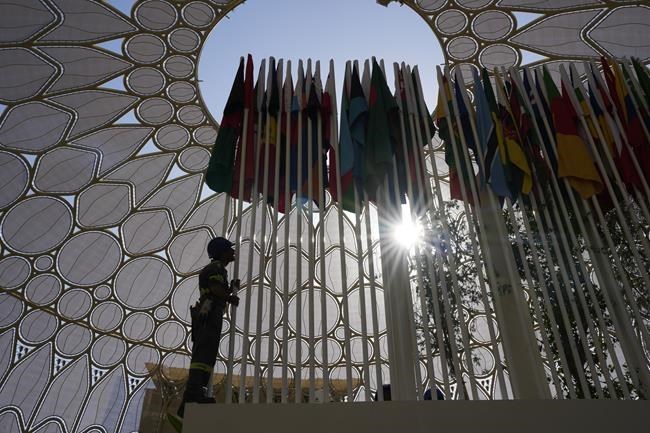TORONTO — As global leaders prepare to meet for the first dedicated health day at a UN climate summit, Canadian doctors plan to use the platform to push for a new federal office dedicated to addressing the health effects of climate change.
The president of a major national physicians group says a summer of record-breaking heat and air-polluting wildfires drove home the urgent need for decision-makers to organize a pan-Canadian response.
A proposed national "climate and health secretariat" would work across governments to chart a course to a climate-resilient and low-carbon health-care system, said Dr. Kathleen Ross, president of the Canadian Medical Association.
"We recognize that the solution to our climate crisis isn't uniquely poised in just one silo of the government," said Ross.
Sunday will mark the first time a UN climate summit, known this year as COP28, will dedicate a day to exploring the links between health and climate change, which the World Health Organization labelled the greatest health risk of the 21st century.
"Climate change is really a health threat multiplier, and I think that's the message we need to bring," said Ross, who is attending COP28.
Doctors and climate scientists say Canada has already seen harrowing examples of how a warming world will affect health care.
More than 600 people died heat-related deaths under British Columbia's 2021 heat dome. Unprecedented wildfires this summer choked the air with pollutants, pausing school activities and creating heightened risks for people with asthma and heart disease. Yellowknife's hospital, along with the rest of the city, was evacuated under threat of encroaching flames.
If the planet were a patient, Dr. Courtney Howard says she would be moving it to the trauma room.
"Phasing out fossil fuels is the most important treatment," said Howard, an emergency physician in Yellowknife who is also the head of the International Society of Doctors for the Environment's delegation to COP28.
Framing the climate crisis as also a health-care crisis "completely changes the stakes" of the issue, said Howard. It makes tangible climate change's far-reaching and direct effects on human health, from the food we eat to the air we breathe, she said.
"I also have an obligation and a responsibility to advocate for health public policyon behalf of my patient population, which, given that I serve a vulnerable patient population and one of the most rapidly warming places in the world, very much foregrounds climate change for me," said Howard.
But Canada needs to do more to make sure its health-care system isn't exacerbating the problem, Howard said. While the federal government signed on at COP26 two years in Glasgow to a pledge to develop a low-carbon and resilient health-care system, Howard said, "we have barely got started on implementing it."
"We don't even really have official stats on where we're at right now in terms of greenhouse gas emissions, let alone a plan to get us to net-zero," she said.
"Other countries are very much, not only getting ahead in terms of their plan, but they're starting to steal our people because we don't have a plan and we don't have jobs for them."
The health-care sector is estimated to account for about four per cent of Canada's total emissions. Health-care leaders have looked to build from more energy-efficient hospitals, bring in virtual-care options to reduce transportation emissions and electrify ambulances. Doctors are also looking at how to cut the use of single-use plastics and what types of drugs to prescribe.
Some inhalers, for example, which are often in high demand during air-polluting wildfire events, use potent greenhouse gases to propel the drug into the lungs, spurring efforts to prescribe low-carbon alternatives.
Part of the solution is also better education for people in health care, said Howard. She plans to use her time at COP28 to get more doctors, nurses and organizations signed onto a pledge to improve climate change education across the medical profession.
"This is also on us as health-care practitioners to lead by example and to learn," said Howard.
Doctors also stress climate change is exacerbating health-care inequities, from food security effects in remote Indigenous communities to extreme heat effects on homeless populations.
"It's also people who are living in poverty and maybe can't afford an air conditioner or perhaps can't afford to run their air conditioner because of the cost of electricity," said Dr. Samantha Green, a family physician working in Toronto's downtown Regent Park neighbourhood and the president-elect of the Canadian Association of Physicians for the Environment.
"It's people who are living in dense, usually racialized neighbourhoods which lack adequate tree cover -- and in these urban heat islands, temperatures can be up to 12 degrees hotter than surrounding neighbourhoods."
Another overlooked health implication of climate change, said Green, is its many effects on mental health. Climate change anxiety rates, especially among young people, are on the rise and studies have noted elevated rates of post-traumatic stress disorder among survivors of climate-driven disasters.
Green says while she supports the idea of a climate and health secretariat, she hopes the idea doesn't "overshadow the fundamental importance of ... phasing out fossil fuels" at the COP28 conference.
"That's the most important action that Canada can take."
This report by The Canadian Press was first published Dec. 2, 2023.
Jordan Omstead, The Canadian Press



